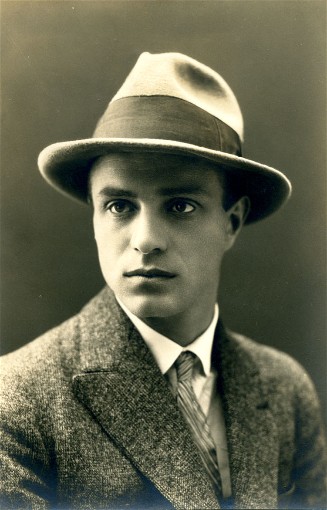Irchan, Myroslav
Irchan, Myroslav [Irčan] (pen name of Andrii Babiuk), b 14 July 1897 in Piadyky, Kolomyia county, Galicia, d 3 November 1937 in the Solovets Islands. Writer. A graduate of the Lviv Teachers' Seminary (1914), he joined the Ukrainian Sich Riflemen shortly after the outbreak of the First World War. During the war he began writing extensively and started to be published. He eventually ended up in the ranks of the Red Ukrainian Galician Army and edited its periodical Chervonyi strilets’. In 1921 he moved to Kyiv, where he joined the editorial board of Halyts’kyi komunist, and in 1922–3 he lived in Prague, where he continued his studies at Charles University. He then accepted an invitation to come to Canada to undertake editorial and organizational work for the Ukrainian pro-Communist left. From 1923 to 1929 he lived in Winnipeg, where he edited some periodicals of the Ukrainian Labour-Farmer Temple Association (ULFTA)—Robitnytsia and Svit molodi—and founded the writers' group Zaokeanskyi Hart, which was affiliated with the Kharkiv-based proletarian writers' organization Hart. At the same time he continued his writing.
From 1929 Irchan lived in Kharkiv, where he headed the organization of Western Ukrainian Communist émigré writers Zakhidnia Ukraina and edited its monthly journal—Zakhidnia Ukraïna— until its demise in 1933. He was arrested in late December 1933 for allegedly belonging to a counter-revolutionary organization and sentenced to ten years in a labor camp on the Solovets Islands. The eventual admittance of Irchan’s arrest (as well as that of a second Canadian Communist activist, Ivan Sembai) was met with shock and disbelief by the rank-and-file of the ULFTA in Canada, and questions regarding the entire matter played a crucial role in the development of a major organization rift led by Danylo Lobai in 1935. His case was later reviewed by an NKVD tribunal and he was resentenced to be shot. He was posthumously rehabilitated in 1956.
Irchan is the author of about two dozen collections of prose, dealing mainly with the Ukrainian-Polish War in Galicia, 1918–19, and the tribulations of Ukrainian peasant life in Galicia and the New World. Irchan also wrote 11 plays (7 of them in Winnipeg) on similar themes, which were immensely popular in their day among Ukrainian Canadians. They include Buntar (The Rebel, 1922), Rodyna shchitkariv (The Family of Brush Makers, 1923), Dvanadsiat’ (The Twelve, 1923), Pidzemna Halychyna (Underground Galicia, 1926), Radii (Radium, 1928), and Pliatsdarm (The Battle Zone, 1933). He is also the author of two volumes of memoirs about the Ukrainian-Polish War, Trahediia Pershoho Travnia (The Tragedy of the First of May, 1923) and V bur'ianakh (In the Weeds, 1925).
Irchan has been the subject of a substantial body of Soviet Ukrainian literary scholarship, including monographs by Leonid Novychenko (1958), Vladen Vlasenko and Peter Krawchuk (1960), and Leontyna Melnychuk-Luchko (1963), and a bibliography by Volodymyr Mashotas (1961). A two-volume selection of his works was published in Kyiv in 1958. Krawchuk also wrote The Unforgettable Myroslav Irchan: Pages from a Valient Life in 1998. A study of Irchan’s prose pieces, by Myroslav Shkandrij, appeared in the Journal of Ukrainian Studies, vol 25, nos. 1–2 (Summer–Winter 2000).
Ivan Koshelivets, Roman Senkus
[This article was updated in 2009.]
